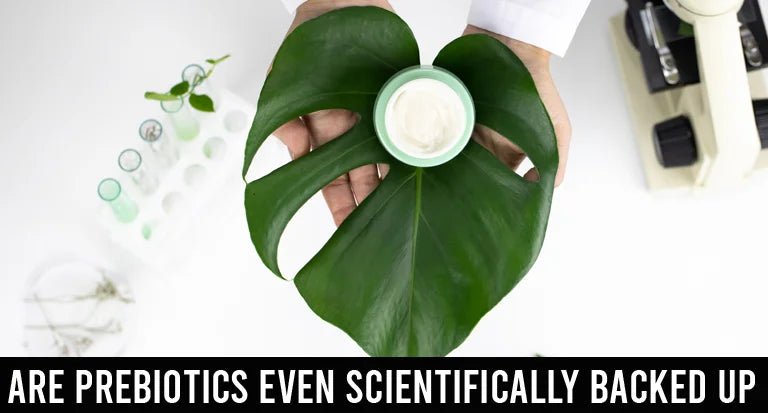You’ll be pleased to learn that the skincare industry is being revolutionised by the microbe-friendly mindset. A number of independent skincare entities now focus solely on nourishing the skin’s microbiota/microbiomes.
But, is the fuss really worth the hype? Let’s get some facts straight.
WHAT ARE PREBIOTICS?
Prebiotics are substances made up of carbs that humans can’t digest (mainly fibre). This fibre is consumed by the good bacteria in your intestines.

“Microbiota/microbiome is the universe of microorganisms that live in and around our bodies”, says Richard Gallo, MD, PhD. He is a renowned dermatology professor. And also, the department’s founding chairman at the University of California, San Diego. His study focuses on the microbiota/Microbiomes of the skin.
You read that correctly: there are over one trillion bacteria living in and on our skin, crawling, eating, and metabolising, representing around a thousand different species.
These beneficial bacteria
- help us fight illnesses,
- protect ourselves from environmental harm,
- strengthen our immunity,
- control our pH levels,
- ..and keep our skin looking lush and dewy.
WHAT DO WORLDWIDE RESEARCHERS HAVE TO SAY ABOUT THIS?
Your skin’s microbiome regulates inflammation and acts as a barrier against pathogens, making it the biggest organ in your body. Some skin microorganisms are useful or harmless. Good skin bacteria, according to Gallo’s research, aid in the killing of harmful germs such as antibiotic-resistant Staphylococcus aureus.
Specialists say, The more bacterial species on your skin, the healthier your skin’s barrier will be, and you’ll have less dryness, irritation, itching, and stinging.
Debra Jaliman, MD, a certified dermatologist in New York City and also the author of the book “Skin Rules: Trade Secrets from a Top New York Dermatologist,” believes; bacteria can help improve skin health by limiting infections from becoming more serious.
Other bacteria can have both beneficial and detrimental impacts. For example, germs like Cutibacterium acnes can be beneficial to your skin. Too much, on the other hand, can lead to acne. Whereas, Chronic inflammation, stress, pH changes in the skin, and your nutrition, among other things, can cause a microbial imbalance.

According to new research, skincare products including prebiotics can help restore the balance of healthy bacteria. A healthy microbiota/Microbiomes can help prevent eczema, acne, dry skin, wrinkles, and skin cancer caused by UV exposure.
MORE ABOUT PREBIOTICS
- Prebiotics can be thought of as fertilisers for healthy bacteria.
- Prebiotics are nondigestible substances that nourish and sustain good bacteria while keeping bad bacteria at bay.
- Prebiotics, which are commonly referred to as complex carbohydrates in foods, are essentially anything utilised to shape the [microbial] environment and transform it in a way that promotes health according to researchers.
HOW PREBIOTICS HELP IN SKIN BETTERMENT?
Acne treatments like retinoids and benzoyl peroxide, as well as skin diseases like rosacea and atopic dermatitis, can damage the skin’s barrier function.
They mainly protect against harmful bacteria. Certain prebiotics assists in balancing the skin’s pH or maintain the skin’s barrier function. (both of which enhance good microorganisms)

However, according to scientists and researchers, there is less peer-reviewed scientific research on topical prebiotics than there is on probiotic skincare (as it has been known and studied earlier).
Every skincare product that enhances the skin has a prebiotic advantage.
Let’s look at an example-
- Moisturizer lipids assist the skin’s barrier function and have been proven to promote the growth of good skin microorganisms. Your microbiota improves when you use a common moisturiser and your skin becomes less dry and red. That is undeniably true. In some ways, one could say that the concept of prebiotic therapy is already being used by moisturisers. You can’t help your skin without also helping your microbiome.
They’re all inextricably linked.
So going through the following, we can conclude that incorporating prebiotics into skincare products is an absolutely amazing idea.
Note-
Prebiotic substances aren’t often adequately labelled.
The substances listed below, on the other hand, contain prebiotic properties that help to relax the skin and feed beneficial bacteria:
- amino acids calcium
- magnesium sulphur plant sugars such as fructooligosaccharides
- galacto-oligosaccharides, and
- fructooligosaccharides
Even with this thorough research and findings, keep in mind that the Food and Drug Administration(FDA) has not given its seal of approval to any microbiome skincare products.
Good bacteria abound on your skin, aiding its immunological and barrier functions.


